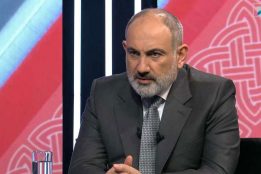
Nagorno-Karabakh, a mountainous area in the South Caucasus, has a troubled history. In 1923, Stalin made the region a part of Azerbaijan, despite the fact that most of the population was Armenian. Two decades ago, following the demise of the Soviet Union, Armenia helped the region fight a war of secession; the Armenian side killed countless civilians, and 900,000 of the Azerbaijanis who had lived in Nagorno-Karabakh for centuries were driven out.
In 1994, Azerbaijan agreed to a ceasefire that allowed Nagorno-Karabakh to function more or less as an independent state. However, the region still formally belonged to Azerbaijan, and Armenia, thinking itself the rightful owner, continued to occupy parts of it. This has led to continuing tension, and a 2008 U.N. resolution held that Armenia should pull its troops out.
At its Lisbon summit in November, NATO formally took Azerbaijan’s side, recognizing the country’s “territorial integrity, independence and sovereignty.” Eleven days later, an Organization for Security and Cooperation in Europe (OSCE) summit became the scene of another rather abusive round of recriminations between Armenia and Azerbaijan, but the OSCE could not come up with an action plan. Armenian president Serzh Sargsyan threatened to recognize the independence of Nagorno-Karabakh, a step that would lead to the incorporation of the region into Armenia. That could mean, if not war, then permanent hostility between Armenia and Azerbaijan.
The U.S. has displayed indifference, or at least apathy, toward the situation. This needs to change. Armenia’s threats reflect the facts that NATO disregarded Armenia’s claims and that the OSCE, largely because of distrust between the U.S. and Russia, cannot bring itself to function as intended (i.e., as a mediator). But the threats also reflect the fact that behind most of the headlines, this has been a very good year for Azerbaijan in its international relations, particularly its energy diplomacy. As a result, Azerbaijan has become more strategically important to the West, including the U.S.
Baku has stood its ground with Moscow. While doubling gas exports to Russia, it signed a major deal with BP to develop new gas holdings off its shores, thus not only maintaining its energy independence, but also demonstrating the importance of the planned Nabucco pipeline to Europe. Azerbaijan has also visibly improved its relations with Turkmenistan, to the point where a Turkmen decision to send its gas to Europe through pipes traversing Azerbaijan is now quite conceivable. Further, Azerbaijan signed a four-party deal to build an Interconnector that will send Azeri gas through Georgia and the Black Sea en route to Romania and then Hungary. This deal enhances Azerbaijan’s importance to Southeastern Europe as a reliable supplier of oil and gas. Also in 2010, Azerbaijan improved its ties and signed an energy agreement with Turkey.
While these agreements cannot hide the fact that no progress was made on Nagorno-Karabakh — over 30 serious incidents occur daily on the “Line of Contact” there — they do show Azerbaijan’s growing importance to Europe and self-confidence in international affairs. Armenia, by contrast, has little to show for its efforts except continuing dependence upon Russia. For example, because of its refusal to negotiate with Azerbaijan, Armenia remains estranged from Turkey — a situation that decreases Armenia’s GDP by 15 percent. Recent reports show that Armenia ran weapons to Iran, something that will hardly endear it to the West.
The visible tone of frustration expressed by President Sargsyan at the OSCE summit in Astana reflects the awareness that Armenian policy has hit a brick wall. Yet the country shows no sign of changing. Meanwhile, Azerbaijan’s spending on defense alone outstrips the combined budgets of Armenia and Karabakh.
In the absence of a viable negotiation process, the rise in Azeri standing and capability forces us to consider a troubling possibility: Those in Baku who espouse a military solution, and those in Yerevan who fear a dwindling advantage and thus advocate preventive strikes, could gain the upper hand. Renewed military action would be a humanitarian disaster. Despite Azerbaijan’s high military budget, most analysts still maintain that its military capabilities are not a match for Armenia’s, and that unless Azerbaijan launched only a limited war (the limits of which Armenia might not respect), it would probably lose after the initial shock of its offensive. Moreover, it is likely that Moscow would then intervene, as it did in 1992–93, when it shipped $1 billion of weapons to Armenia to prevent an Azeri victory. This would in turn put Turkey in a bind: Russo-Turkish relations today are very good (they were not in 1993), but Turkey is also allied with Azerbaijan. If Turkey failed to intervene on Azerbaijan’s behalf, it would lose whatever claim to respect it has in the Caucasus, something that it is hard to envisage Ankara accepting quietly. Because of its conflicts of interest, Russia is incapable of mediating this dispute by itself. If NATO is serious about its summit declaration, and if there really is a genuine reset between Moscow and Washington, the OSCE’s Minsk Process — run by the U.S., Russia, and France — should mediate, and the U.S. and France must take active, even leading roles. Polls show that most Azeris still think of the U.S. as a reliable ally — in spite of the neglect shown by Washington to Baku this year, and the attitude of several officials, mainly in the State Department, that Azerbaijan’s sole importance lies in the fact that our military must fly through it to get to Afghanistan.
The 2008 Russo-Georgian War showed that even small wars in the Transcaucasus can have repercussions that far transcend the region. Failure to take an active role in resolving the Nagorno-Karabakh issue not only cements Armenia’s dependence upon Moscow and estrangement from Turkey and Europe; it also undermines the success Azerbaijan has had in strengthening Europe’s position vis-à-vis Russia on energy security. Continued neglect of Azerbaijan, and of the Transcaucasus as a whole, can only erode U.S. standing and damage its credibility in the region, confirming Russia’s belief that the reset policy amounts to an acknowledgement of its right to a sphere of influence over the Commonwealth of Independent States. Under the circumstances, the ongoing failure of the U.S. to play an active role here makes no sense at all — and worse, encourages the drift to war.
National Review Online




































